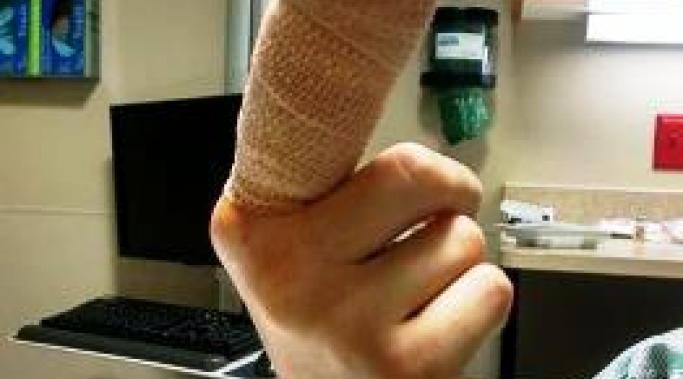Managing an anxiety disorder is a bit like navigating a minefield. There are safe places to step and there are dangerous places to step. The trick to navigating a minefield successfully is to not step on any mines, which is made easier by being able to detect where the mines are buried. The trick to navigating anxiety is much the same. Avoid the anxiety and/or panic attack by knowing how to avoid the triggers.
Anxiety-Schmanxiety
I once had a therapist whom I admired, respected, and trusted who observed during a particular session that I have an anxious personality. Hmm. What, I wondered, did that actually mean? Is that better than the anxiety disorders I had previously been diagnosed with? Or was it worse, because “disorder” implies that something can be improved, whereas a personality is just what it is? Of course my anxiety skyrocketed and I set out to discover what personality has to do with anxiety.
As of this writing, I live with my wife. But before I lived with her, I had a variety living situations, including living alone and with a roommate. Anxiety and panic attacks occurring at home are fairly common for many of us with anxiety disorders and disorders don’t much care what your personal living situation is.
Panic and anxiety attacks in public present a special kind of frustration because, in addition to the attack, we have to deal with the embarrassment of being sick in public. Even during my worst panic attack in a public forum, I was still concerned with what others thought of me and whether or not they were judging me.
Anxiety can be beastly. It can take hold of our thoughts, feelings, and behaviors. Anxiety seems to take control of our physical body, too. How on Earth do we combat such a beast? How about with bubbles?
Assertiveness doesn't come easily to many people, myself included. Sometimes, the mere thought of having to express myself or make some need or another known is enough to kick anxiety into high gear. When engaged in a situation where it’s necessary to assert yourself—from speaking up to a supervisor about something you think isn’t quite right to informing a friend that you hate the restaurant she chooses every time you have lunch together, and a million other situations—anxiety can stop you in your tracks. Indeed, it’s difficult to be assertive when we’re nauseous, dizzy, sweaty, and unable to breathe properly let alone think clearly or concentrate. Happily, we’re not doomed to a life of passivity.
Most everyone engages in conversation daily. From talking to the members of our household, to answering the phone, to ordering our coffees in the morning – talking to those around us occurs often.
One doesn't need to have an anxiety disorder to know that certain conversations provoke a sense of discomfort or even dread. Arguing with a loved one, consoling someone at a funeral, or even telling someone “no” can cause anyone anxiety.
This, of course, makes us wonder: if it is reasonable that certain conversations or subjects cause most people anxiety, what does it do to a person with an anxiety disorder?
Humpty Dumpty sat on a wall. Humpty Dumpty . . . whoa, did you see that squirrel run across that wall, well, I guess it’s a fence, chasing . . . eggs . . . I need to go to the grocery store because we have no food because I keep forgetting to go and I’m tired of fast food . . . that squirrel was fast and he’s gone . . . I love fall . . . I keep forgetting to schedule my daughter’s senior pictures.
Wait. What was I doing? Oh yeah, reading this nursery rhyme.
Ugh! How am I going to be able to hold down a job if I can’t even read a stupid nursery rhyme? I guess I wouldn't have to remember going to the store then because I wouldn’t have any money. I’m so useless. How am I supposed to concentrate when there’s so much pressure in my head? Make it stop! What is wrong with me?
Like many people, I have been diagnosed with more than just anxiety. While it is possible to be diagnosed with just an anxiety disorder, I was not fortunate enough to be one of those people. As I have discussed before in this blog, I have co-occurring bipolar and anxiety disorders.
As readers of my blog will know, each of these disorders is awful in its own way. Occasionally, I’m asked which one I hate more. Sometimes, I wonder this, myself.
If you've ever had a panic attack, you know what it’s like. You’re just going about your life, perhaps in class or a meeting or a store or somewhere else, even home, when bam! Out of the blue, your heart begins to pound and your head begins to swim. The world around you blurs. Your hands shake and sweat. You can’t breathe, and your chest constricts painfully. The ground wobbles, making it all the more difficult for your weak legs to keep you steady. You’re nauseated and oh god you don’t want to get sick. And as if symptoms like these (they can vary a bit from person to person) aren't horrible enough, on top of all this you begin to doubt and question yourself.
Over the weekend, my wife was bitten by a dog. It was a serious bite, costing her the tip of her right index finger. I was present when it happened, watching in horror as she stepped in between two angry lab-mixes that were fighting over a bone.
We went from watching college football to panic in less than 30 seconds. As my wife sat down, holding her bloody hand, there wasn't time to think about much. My only concern was how to help her. My mother-in-law had separated the dogs, placing one in a cage, and raced over with napkins and began to apply pressure to my wife’s wound. At that moment, we had no idea how serious the injury was.








